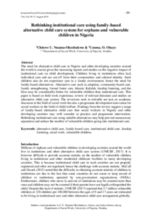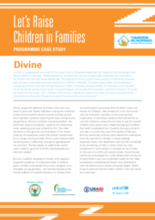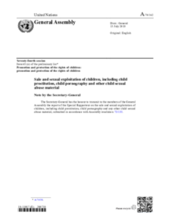Displaying 181 - 190 of 660
For this study, a general sample of the New South Wales (NSW) public completed an online survey about adoption practices and their willingness to consider adopting from out-of-home care, with background questions on perceived social support and life satisfaction.
This paper is based on field work experience, review of relevant literature and studies on alternative child care system in Nigeria.
This article describes how the disconnect experienced by Aboriginal children removed from their families and communities in Australia is understood as a dysphoria holding both body-focused aspects and cultural aspects.
This article explores how the type of placement in children's social care influences identity formation and contact with the birth family. It draws on 40 life history interviews with Romanian-born, care experienced young people who entered adulthood from different types of placement: 16 from residential care, eight from foster care, seven from domestic adoption and nine from intercountry adoption.
This case study profiles the reintegration experiences of one child who has participated in the Tubarerere Mu Muryango (Let’s Raise Children in Families - TMM) programme in Rwanda.
The National Quality Improvement Center for Adoption and Guardianship Support and Preservation (QIC-AG) is a five-year project working with eight sites that will implement evidence-based interventions or develop and test promising practices which if proven effective can be replicated or adapted in other child welfare jurisdictions. This webinar presented learning from the project related to staffing and staff support, recruitment and retention, cost/sustainability, stakeholder collaboration, and logistics.
This article explores the findings of a study on the role of the social worker in adoption with a focus on ethics, concentrating on the perspectives of adopted people, birth parents, and adoptive parents.
This radio segment from the program 'This American Life' tells the story of Shamyla, who grew up as the adoptive child of her aunt and uncle in the United States but whose biological parents in Pakistan wanted her back in their care.
In this article, the authors present some results from the first qualitative study that explores the experiences of some Chilean adults who were adopted and searched for their origins in Chile through the National Service of Minor's Search for Origins Program.
In the present report, the UN Special Rapporteur on the sale and sexual exploitation of children, including child prostitution, child pornography and other child sexual abuse material, describes the activities undertaken in relation to the discharge of her mandate since her previous report to the United Nations General Assembly. The report presents a thematic study on safeguards for the protection of the rights of children born from surrogacy arrangements, highlighting the rights of the child to identity, access to origins and to a family environment.



